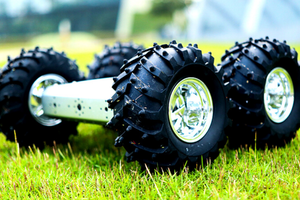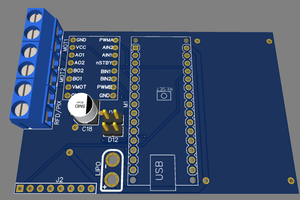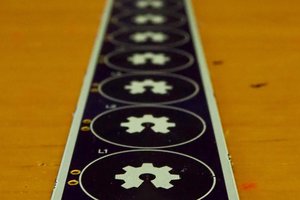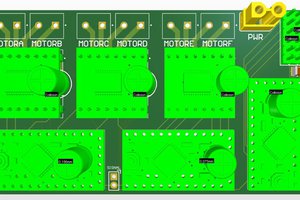Story
Those who ever worked with arduino they know the pain of connecting multiple components to the arduino for there projects. so here is the answer for you all.
Not only 2 or 3 you can connect 11 components at same time & on board 5V & 9V regulator,
cross polarity protection, power indication LED,
motor power selection provision (5V or 9V or 12V) manual provision for stepper motor microstepping setting.
Wide range of input supply (9V to 24V). This is my multipurpose PCB works with Arduino Nano, I have designed it in a way that you can run 2 Stepper motors, 2 DC motors, 2 Servo motors at same time and this is not it you can even connect BT module, rotary encoder, I2C device, potentiometer at same time.
This PCB is very much helpful in building any project and no need to worry about messy wire connections.
I design this PCB in Easyeda and order it from JLCPCB.COM they offer very affordable rate for quality PCB.
Step 1: Overview of PCB

1 / 4
He we first see the overview of PCB means what is this PCB capable of and which components you can connect to the PCB.
List of the Components you can connect to the PCB
- 2 DC motor ( 9V to 24V DC)
- 2 Potentiometer
- 2 Servo motors ( 5V to 9V DC)
- 1 Serial device (BT module, HMI, Communication module, RX, TX)
- 1 Encoder (2 interrupt pin & 1 PB pin)
- 1 I2C device (SCL/SDA Device, display, MPU6050 etc)
- 2 Stepper motors
Special features of PCB
- Wide range of power input 9V to 24V DC
- Cross polarity protection
- DC motor voltage selection 9V or 12 V DC
- Servo motor voltage selection 5V or 9V DC
- Manual microstepping setting for stepper motor
- Power indication LED
- L298N IC for heavier DC motor
- ON board 5V and 9V regulator no need to arrange different power sources
- Header pins and screw terminals for easy connections
Step 2: PCB Design and PIN Details

1 / 5
I have design circuit and PCB ineasy EDA and ordered PCB from JLCPCB.COM
JLCPCB.COM are the world leader in PCB manufacturing there PCB production rates are very much affordable and they have world class PCB production unit results fast PCB production.
I have provided the link of circuit desgin so that you can modify it as per your need if you need to change any thing.
https://oshwlab.com/sharmaz747/multipurpose-pcb
Pin details of PCB
DC MOTORS
- EN1, EN2 = D9
- IN1 = D7
- IN2 = D8
- IN3 = D10
- IN4 = D11
POTENTIOMETER
- P1 = A6
- P2 = A7
SERVO MOTORS
- S1 = D5
- S2 = D6
SERIAL COM.
- DO = TX
- D1 = RX
ENCODER
- PB = D4
- IN1 = D2
- IN2 = D3
I2C PORT
- SCL = A5
- SDA = A4
STEPPER MOTORS
- EN = D12
- DIR1 = A0
- STP1 = A1
- DIR2 = A2
- STP = A3
Step 3: Component Used

- 5V DC Jack ----- 1 no
- LM7805 ---- 2 nos
- LM7809------1 no
- 4.7uF cap ------ 1 no
- 1uF cap ----- 2 no
- 47uF cap ---- 1 no
- N5408 Diode ----- 1 no
- FR207 Diode ------ 8 nos
- 5mm LED ------ 1 no
- L298N IC ------- 1 no
- Arduino Nano ----- 1 no
- A4988 driver ------- 2 nos
- Screw terminals ------ 2 x 6 nos
- Male female header pins
- 200 ohm Resistor --- 1 no
- 1.5K ohm Resistor ---- 2 nos
Step 4: Arduinio Code for Demo RUN

Below is the link to download the demo code so that you can connect all the components with PCB and run them one by one with the help of encoder and 16x2 LCD display
https://drive.google.com/file/d/1ILjvVcAtpka4v8WJR...
 sandy
sandy


 Jithin Sanal
Jithin Sanal

 Carl Bugeja
Carl Bugeja
 Umut Çağrı MANGALTEPE
Umut Çağrı MANGALTEPE
Nice project. For you next rev, you should look at supporting TMC stepsticks. In particular, SPI programming so you can activate some of the control options.
And, you really should add 100 uF caps for each stepstick.